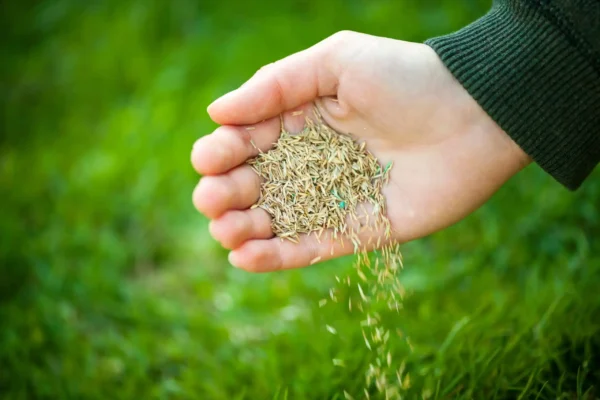Insecticides and fertilizers are both essential for lawn care, but applying them together may cause problems. Mixing the two can reduce their effectiveness, as they may interfere with each other’s absorption. Here are some potential issues that could arise from mixing them:

- Chemical Interactions: Some fertilizers and insecticides can react chemically when combined, potentially lowering their effectiveness or creating unintended consequences. For example, certain fertilizer chemicals might degrade or change the properties of insecticides.
- Increased Safety Risks: When combined, chemical products can behave unpredictably, increasing the risk of harmful effects on both your safety and the environment.
- Excess Stress on Your Grass: Applying too many chemicals simultaneously can overwhelm your grass, leading to unnecessary stress. Using the products separately ensures each one works at its full potential.
Need Lawn Care? We Can Help.
Click the button below to leave your information & we'll be in touch in an hour or less.
Need Pest Control Service?
Leave your information below and we’ll be in touch with a FREE quote!
"*" indicates required fields
*During normal business hours. After hours calls will be returned the next business day.
Natural Pest Prevention Tips
Preventing pests from taking over your lawn requires a mix of proactive measures that make your property less inviting for them. Here are some proven methods to keep pests away:
- Proper Lawn Maintenance: Keeping your lawn healthy is essential for preventing pests. Practices like correct mowing, consistent fertilization, and appropriate watering enhance lawn resilience, making it harder for pests to thrive and allowing quicker recovery from any damage.
- Routinely Mow Your Grass: Mowing your lawn at the proper height for your grass type is vital. Cutting too short weakens the grass and leaves it vulnerable to pests, while slightly longer grass supports deep root growth and creates shade that inhibits weed seed germination.
- Water Thoroughly: Instead of watering frequently with shallow amounts, water deeply and less often. This encourages the roots to grow deeper, making it harder for pests that thrive in shallow soil to survive. Be cautious not to overwater, as this can attract pests and cause other lawn problems.
- Address Drainage Issues: Ensure your lawn has proper drainage to avoid water pooling, which can attract pests. Fix areas with poor drainage, adjust the grading where necessary, and avoid overwatering to keep your lawn healthy and less inviting to pests.
- Remove Debris and Thatch: Clear away any fallen leaves, lawn debris, and excessive thatch regularly. These materials can serve as hiding spots and breeding grounds for pests, increasing the chances of an infestation if not removed.
- Keep an Eye on the Condition of Your Lawn: Inspect your lawn periodically for any signs of pests or damage. Look for visible chew marks, discoloration, or signs of burrowing. Catching any issues early allows you to address them before they lead to widespread damage.
- Use Integrated Pest Management (IPM): Use a combination of pest control methods in an Integrated Pest Management approach. This includes monitoring pest activity, introducing beneficial insects, using cultural practices, and reserving pesticide use for the most persistent problems.
Insecticide and Fertilization Tips
If your lawn requires both fertilization and insecticide treatments in quick succession, it’s best to wait a few days between each application. This allows the products to work effectively without interfering with each other. Be sure to follow the manufacturer’s instructions for each product to ensure safety and protect your lawn.
If you want a healthier, well-maintained lawn, it’s a good idea to hire a lawn care professional. They can take care of pests, fertilize your grass, and provide ongoing maintenance, along with answers to any lawn-related questions. With their expertise, you can ensure your lawn remains vibrant and thriving throughout the year.
